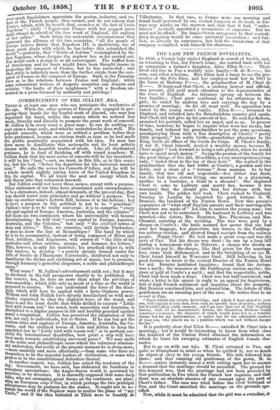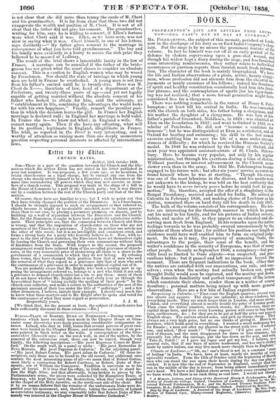THE LAST NEW FRENCH NOVELLETTE.
IN 1856, a French lady visited England in search of health, and, on returning to Pau, her French home she carried back with her as companion a farmer's daughter, Alice Ellen B—. There lived and live in Pau a worldly wise family—M. de X—., his sons, and other relations. Miss Ellen had a fancy to see the pro- cession of the Fête Dieu, and her employer took her in 1857 to the house of Madame F—., the grandmother of M. Cheri de X—. It happened that Cheri a sucking lawyer and official, was present, and paid much attention to the representative of the roses of England. An intimacy sprung up between the two families ; Cheri grew assiduous in his attentions to the girl ; he ended by making love and carrying the day by a promise of marriage. So far all went well. No opposition was raised by the young man's family. Ellen B—. returned. to England, and subsided into the Herefordshire country girl again. But Cheri did not give up his pursuit of her. He sent her flowers, promised his portrait, called her an angel, and so on. In process of time, however, he began to inquire what were her means, her family, and induced his grandmother to put the same questions accompanying them with a fine description of Cheri's "pretty little property," his noble birth—grandfather physician to the King, uncle an officer of the Garde du Corps. M. Cheri's family, if not M. Cheri himself, desired a wealthy spouse, because M. Cheri might "look forward to being a sub-prefect, when he would have to spend much money." Seeing the passion of the family for the good things of this life' Miss Ellen, a very unscrupulous young lady, "fooled them to the top of their bent.' She replied to the grandmother that she had 4000/. at Coutts's, a garden and two fields, and a share of a " fortune " from mamma. As to her family, that was old and respectable—her father was dead, but she had three sisters living, one married to a physician another to a barrister, a third to a chemist! She implored Cheri to come to Ledbnry and marry her, because it was necessary that she should give him her fortune with her own hands. The golden bait took. Cheri rushed. to England. Pausing in London he imparted his good fortune to M. Brunier, the landlord of the Panton Hotel. Now this person's experience of "what stuff English parents and their marriageable daughters are made of" led. him to caution the young man ; but Cheri was not to be restrained. He hastened to Ledbury and was married—the sisters, Mrs. Barrister, Mrs. Physician, and Mrs. Chemist, assisting at the wedding. The fees were paid by a cheque on Coutts's; the bride assured her spouse that she had sent her baggage, her pianoforte, her horses' to the Padding- ton railway-station, and showed forged receipts from the railway people. Happy Cheri! He had. made a great coup and was the envy of Pau. But his dream was short ; he ran up a long bill during a honeymoon visit to Malvern; a cheque was drawn on Coutts's to pay it; the cheque' like that given for the marriage fees, came back dishonoured, and in the twinkling of an eye Cheri found himself in Worcester Gaol. Still believing in his good fortune he wrote to the cynical Brunier of the Penton Hotel for aid. Brunier instituted inquiries ; found that the fortune was a myth ; the treasures at the Paddington station myths ; the store of gold at Coutts's a myth ; and that the respectable, noble, Cheri had been made a dupe. Cheri was but half-convinced, and wrote a letter to his spouse in reply. to an appeal for forgiveness, full of high French sentiment and inquiries about the property. But Brunier convinced him, and released him. The letters of this gentleman are an amusing part of the ease. He writes thus to an avoue at Pan.
"Facts within my certain knowledge, and which I have stated to your son, will explain to you that, from such an ignoble class of society, notlung but horrible ideas could emanate, and I am sure that out of this frightful history, with all its characteristic details, the illustrious Dickens would construct a romance, the elements of which would have led to a terrible drama but for my intervention, or rather but for the admirable conduct of your son, who placed me in a position which was not without danger for me."
It is perfectly clear that Ellen B—. swindled M. Cheri into a marriage ; but it would be interesting to know from what class the landlord of the Penton Hotel obtained the information on which he bases his sweeping estimates of English female cha- racter.
But to go on with our tale. M. Cheri returned to Pau, not quite so triumphant in mind as when he quitted it, nor so much an object of envy to his young friends. His wife followed him there ; and that cunning old gentleman of the gown, M. de X—. senior, instantly issued a writ calling upon her to answer
a demand. that the marriage should be annulled. The ground for this demand was, that the marriage had not been preceded by that publication in Pan which the French law requires and that there was an absolute absence of any consent upon die part of Cheri's father. The case was tried, before the Civil Tribunal of Pan, and the Court annulled the marriage on the grounds spe- cified.
Now, while it must be admitted that the girl was a swindler, it
is not clear that she did more than trump the cards of M. Cheri and his grandmother. It is far from clear that these two did not exaggerate the wealth and position of M. Cheri. It is not at all clear that the father did not give his consent. The grandmother, writing for him, says he is willing to consent, if Ellen's fortune were what Cheri said it was. Ellen, as we have seen, was not slow in saying what it was. Cheri himself, in one of his letters, says distinctly—" My father gives consent to the marriage in consequence of what you have told grandmamma." The boy and his family were evidently in a hurry to secure the rich prize they believed to be moored at Ledbury. The result of the trial shows a lamentable laxity in the law of France. A marriage can be annulled if the father of the bride- groom has not given what the court choses to consider an absolute consent. This is a caution to English women who may be wooed by Frenchmen. Nor should the state of tutelage in which young men are held in France be overlooked. A young man is not free from his father's control until he is twenty-five. Here was M. Cheri de X--. licentiate of law, head of a department at the Prefecture, and twenty-three years of age—and yet not legally capable of getting married without the absolute consent of his father who looked to obtain for him, said the advocate, an "establishment in life, combining the advantages the world looks for with his own happiness." Finally, remark the peculiar posi- tion in which the decision leaves the girl. In France her English marriage is declared null; in England her marriage is held valid. In France she is—we know not what ; in England a wife. She cannot marry again. Then if she have any offspring, what will be its position ; legitimate in England, illegitimate in France. The trial, as reported in the Drat is very interesting, and is worthy of attention as raising more than one deeply momentous question respecting personal interests as affected by international laws.



























 Previous page
Previous page